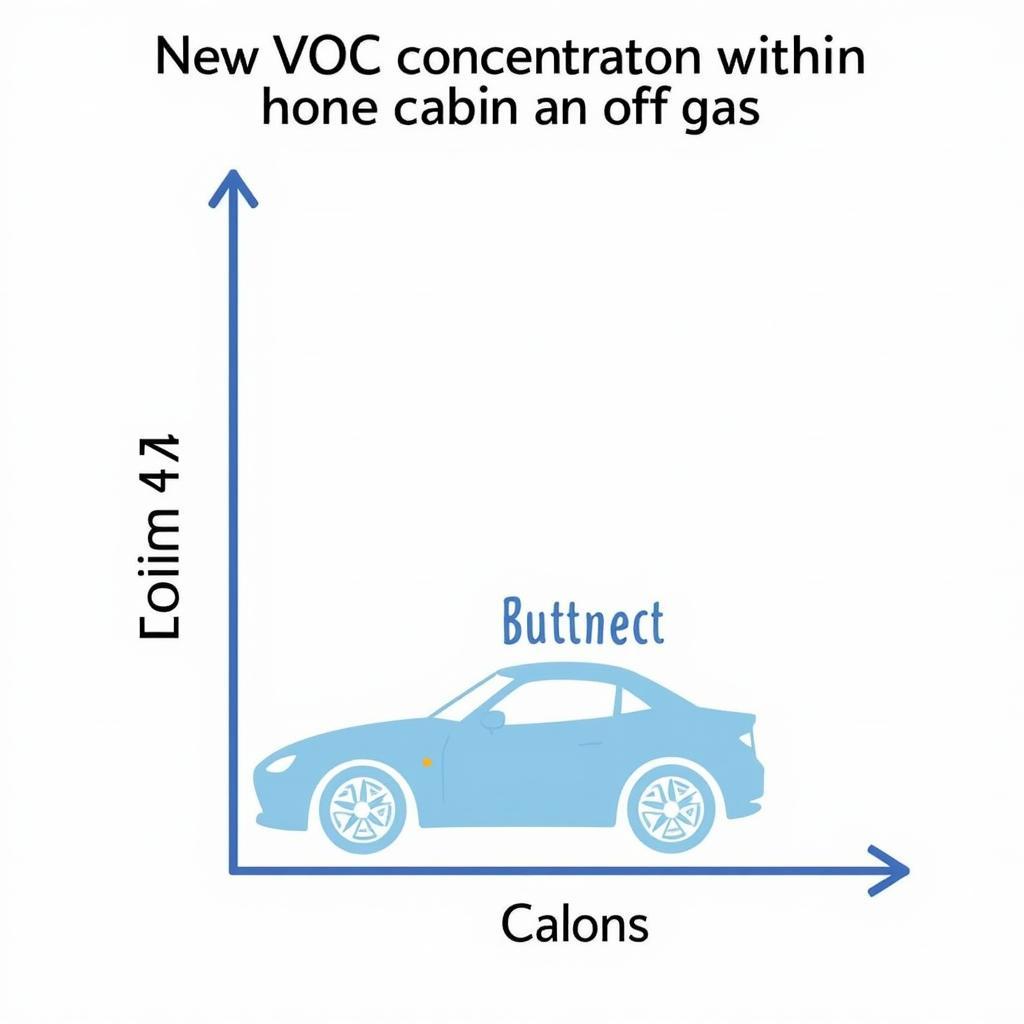That distinctive “new car smell” is a familiar and often pleasant scent. But what exactly creates this aroma, and is it something to be concerned about? This article delves into the science behind the new car smell scent, exploring its chemical composition, potential health effects, and how to manage it. We’ll also discuss some alternatives for keeping your car fresh.
What Creates That New Car Smell?
The new car smell isn’t a single scent, but rather a complex cocktail of volatile organic compounds (VOCs). These chemicals emanate from various materials used in the car’s interior, including plastics, adhesives, fabrics, carpets, and sealants. As these materials off-gas, they release VOCs into the cabin air, creating the characteristic new car smell. Some of the most common VOCs contributing to the aroma include benzene, formaldehyde, toluene, and xylene.
After driving for a while, you might notice you want to refresh your interior. A car air freshner packets can be a quick and easy solution.
 Sources of VOCs in a New Car Interior
Sources of VOCs in a New Car Interior
Is the New Car Smell Harmful?
While the new car smell is often associated with excitement and a sense of newness, it’s important to be aware of the potential health effects of VOC exposure. Some VOCs are known irritants and can cause headaches, nausea, dizziness, and eye, nose, and throat irritation. Long-term exposure to high concentrations of certain VOCs has been linked to more serious health problems.
Fortunately, the concentration of VOCs in new cars tends to decrease over time as the materials off-gas. However, factors like temperature and ventilation can influence the concentration levels and duration of the new car smell.
For those concerned about air quality in general, a car air purifier might be a good investment.
 VOC Concentration Decrease Over Time
VOC Concentration Decrease Over Time
How to Manage the New Car Smell Scent
If you’re sensitive to the new car smell, there are several steps you can take to minimize your exposure:
- Ventilate your car: Regularly open the windows, especially during the first few months of ownership, to allow fresh air to circulate and dilute the VOCs.
- Park in the shade: Avoid parking in direct sunlight, as heat can accelerate the off-gassing process and increase VOC concentrations.
- Use an air purifier: Consider using a car air purifier with an activated carbon filter to help remove VOCs from the cabin air.
- Clean regularly: Vacuum and wipe down surfaces to remove dust and any settled VOC particles.
There are many options available when it comes to improving the scent of your car. You could consider options like bathandbodyworks car freshener.
Alternatives to the New Car Smell
If you’re not a fan of the new car smell or simply want to personalize the scent of your car, there are plenty of alternatives. Natural air fresheners, such as essential oil diffusers or odor absorbers made from charcoal or baking soda, can provide a pleasant aroma without the potential health concerns associated with VOCs.
“Many of my clients are increasingly concerned about air quality and prefer natural alternatives to chemical air fresheners,” says Dr. Elizabeth Carter, an Environmental Health Specialist. “Natural options can be just as effective in neutralizing odors and creating a pleasant cabin environment.”
 Natural Car Air Fresheners
Natural Car Air Fresheners
Remember that sometimes unwanted smells in your car can be caused by pests. Check out this article on the best way to get rid of mice in cars for more information. Another surprising culprit could be a bee infestation as highlighted in this article on bees swarm in car gas tank tiktok.
Conclusion
The new car smell scent, while often appealing, is a complex mixture of VOCs that can have potential health implications. By understanding the science behind this aroma and taking steps to manage it, you can enjoy your new car while minimizing your exposure to potentially harmful chemicals. Choosing natural alternatives for freshening your car’s interior can further contribute to a healthier and more personalized driving experience.
FAQ
-
What is the new car smell made of?
The new car smell is a combination of VOCs released from materials in the car’s interior. -
Is the new car smell dangerous?
While the scent itself isn’t inherently dangerous, prolonged exposure to high concentrations of certain VOCs can be harmful. -
How can I get rid of the new car smell?
Ventilation, parking in the shade, and using an air purifier can help reduce the new car smell. -
What are some natural car air freshener alternatives?
Essential oil diffusers, charcoal bags, and baking soda are natural alternatives. -
How long does the new car smell last?
The intensity and duration of the new car smell vary but generally decrease over several months. -
Can I speed up the process of getting rid of the new car smell?
Yes, increasing ventilation and parking in the shade can help expedite the process. -
Are there any regulations regarding VOCs in new cars?
Yes, there are regulations in place to limit the amount of VOCs emitted from new car materials.
Common Scenarios and Questions
- Scenario: My new car has a very strong chemical smell, and I’m experiencing headaches. What should I do?
- Answer: Increase ventilation by opening windows, park in the shade, and consider using a car air purifier. If symptoms persist, consult a doctor.
Further Reading and Resources
- Explore our articles on maintaining car interior hygiene and air quality.
- Learn more about the health effects of VOC exposure.
Need help with your car’s diagnostics? Contact us via WhatsApp: +1(641)206-8880, Email: [email protected] or visit us at 276 Reock St, City of Orange, NJ 07050, United States. Our customer service team is available 24/7.


